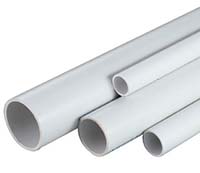Can Pex Water Pipe Be Used In Organic Garden
This entry was posted on April 9, 2020.

More and more Americans are moving toward consuming more natural foods to improve and maintain their health, which means that more people are buying produce from local gardens, farmers markets, and fish farmers. Some are even growing their own produce, often using plastic containers and piping systems that contain PVC. Is that safe? Yes, PVC is a food-safe material for gardens and aquaponics.
What is Food Grade Plastic?
Some plastics are considered food grade while other plastics aren't. Food grade plastic is any plastic that is deemed safe by the U.S. Food and Drug Administration (FDA) to come into contact with something that humans will consume. The FDA has regulations that hold this type of plastic to a higher standard.

Some of the plastics that are safe to use for food and beverage containers include:
•PET or PETE —Polyethylene terephthalate is listed as number 1 inside the recycling triangle diagram. This strong, clear plastic is commonly used for packaging of juices, bottled water, soft drinks, peanut butter, salad dressings, and pickles.
•HDPE – High density polyethylene has a number 2 on the triangle code, and is commonly used for milk and juice bottles and some laundry products. This plastic may be translucent or colored and are somewhat stiff. They are ideal for packaging products that have a short shelf life, such as milk.
•PVC – Polyvinyl chloride isn't only used in the plumbing industry. It is a number 3 in the triangle code and can be used for both food and non-food purposes. However, it's important to make sure that the container you're using hasn't been treated for use in industry before you use it with food products.
•LDPE – Low density polyethylene plastic is a number 4 on the triangle code. This plastic is typically used as bags for frozen foods and bread and as squeezable bottles like those for honey and mustard.
•PP – Polypropylene is noted as the number 5 on the triangle code. This tough plastic is commonly found in margarine containers, yogurt containers, and medicine bottles.
•PS — Polystyrene, a number 6 on the recycling triangle, is a harder plastic or a foam that is hard, clear, and brittle. You'll find PS in plastic plates, cups, cutlery, egg cartons, and meat trays.
•Other — The last triangle code is the number 7. This code means that the package is made with a resin other than the six listed above or is a combination of two or more of them. Food safe number 7s are typically containers like 3- and 5-gallon reusable water bottles, citrus juice bottles, and ketchup bottles.
The Difference Between Regular PVC and Food Safe PVC
PVC piping (such as Schedule 40 here) is commonly used in many applications because it is cost-effective, lightweight, and strong. Regular PVC is made more flexible and softer because plasticizers are added to it. When plasticizers are not added to PVC, it is called Rigid PVC or uPVC, and also known as Food Safe PVC. Food Safe PVC doesn't have any BPA (bisphenol A) or phthalates, making it safe for gardening and outdoor use.
When you are using PVC, it's important to note if it is safe to use around food products. One way to know for sure is by seeing that it has the NSF-51 rating. NSF stands for National Sanitation Foundation, which is an organization that sets and tests public health and environmental safety standards. A rating of NSF-51 means that the plastic meets the standard for "Plastic Material and Components used in Food Equipment," which means that the plastic is safe for use in products that come into contact with foods and beverages.
Can You Use PVC for Aquaponics?

You can use rigid PVC (uPVC) piping in aquaponics. This type of PVC is food safe, so it will not harm any fish or plants that it comes into contact with. In fact, it's ideal to use when building vertical aquaponics systems, growing strawberries, or separating shrimp from fish in an aquaponics system.
Is It Safe to Garden with PVC?
Like with aquaponics, PVC is safe to use in gardening when it is food safe (uPVC). It can safely be used for water lines as well as for growing food directly in large diameter pipes. You can use uPVC for creating vertical gardens, hydroponic gardens, garden irrigation systems, tomato cages, and many other gardening systems.
Is PVC Food Safe?
When the right type of PVC is used (uPVC or Rigid PVC), it is perfectly safe for use in gardening, aquaponics, drinking water systems, or other systems where it will come into contact with food or beverages. However, it's important to avoid over-gluing PVC connections. The chemicals in PVC cement are not food safe. That means that when using PVC glue, it should be done sparingly and carefully so that the chemicals do not come into contact with what is in the piping or PVC containers.
Can Pex Water Pipe Be Used In Organic Garden
Source: https://www.pvcfittingsonline.com/resource-center/can-you-use-pvc-for-gardening-aquaponics/
Posted by: duryeapecter.blogspot.com

0 Response to "Can Pex Water Pipe Be Used In Organic Garden"
Post a Comment